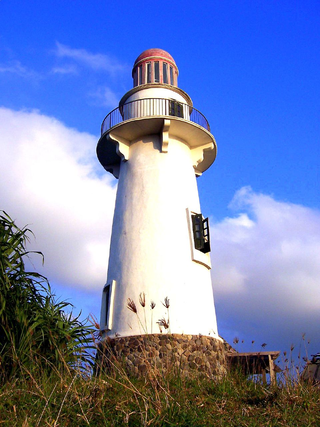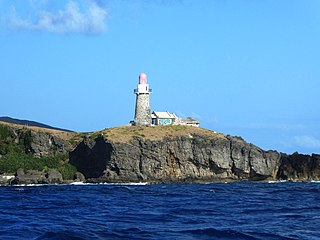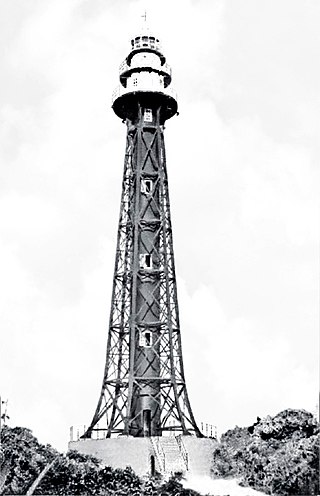
Middle Bay Light, also known as Middle Bay Lighthouse and Mobile Bay Lighthouse, is an active hexagonal-shaped cottage style screw-pile lighthouse. The structure is located offshore from Mobile, Alabama, in the center of Mobile Bay.

Basco Lighthouse is a lighthouse in the town of Basco in Batanes, the northernmost province in the Philippines. Located in Naidi Hills in Barangay San Antonio, the lush green hills and the open sea provide a beautiful backdrop for the lighthouse. The place can easily be reached by a 1.2-km hike from the Port of Basco.

Sabtang Lighthouse is an active lighthouse in Sabtang, Batanes, Philippines.

Cape Bojeador Lighthouse, also known as Burgos Lighthouse, is a cultural heritage structure in Burgos, Ilocos Norte, that was established during the Spanish colonial period in the Philippines. The lighthouse was first lit on March 30, 1892, and is set high on Vigia de Nagpartian Hill overlooking the scenic Cape Bojeador where early galleons used to sail by. After over 100 years, it still functions and serves ships that enter the Philippine archipelago from the north and guide them safely away from the rocky coast of the town.

The Pasig River Light was the first light station in the Philippines when it was established in 1642. The first lighthouse tower in the country was erected in the station and first lit in 1846. It was then located on the north jetty at the mouth of the Pasig River in San Nicolas, Manila, marking the entrance of the river for vessels cruising Manila Bay, looking to dock on the inland Port of Manila that was then located along the banks of the Pasig River in Binondo and Intramuros.

The Maniguin Island Lighthouse is a lighthouse that marks the Cuyo East Passage, a main shipping route south into the Sulu Sea. The island, also known as Maningning Island or Hammerhead Island, is located 42.6 kilometres (26.5 mi) off of the coast of Culasi, Antique in the Philippines. It has a narrow ridge 33.5 metres (110 ft) high across its southern end, and the remainder of the island is low and wooded, and not more than 4.5 metres (15 ft) high. It is fringed with coral reefs with deep water at their edges. The round cylindrical concrete tower with a gallery on top is located near the southeastern point of the island.
Batag Island Lighthouse is a historic lighthouse on Batag Island off the coast of the town of Laoang in the province of Northern Samar in the Philippines. The light marks the northeastern point of Samar Island and led international ships to the entrance of the San Bernardino Strait marked by the San Bernardino Light. One of the most traveled waterways in the archipelago, together with the Capul Island Light, these stations are invaluable to vessels coming from the Pacific Ocean and entering the country through the San Bernardino Strait on its way to Manila or any other ports of the Philippines.

Capul Island Lighthouse is a historic lighthouse on Titoog Point in San Luis on the northern tip of Capul Island, Northern Samar in the Philippines. It marks the western entrance to the San Bernardino Strait coming in from Ticao Pass.

The Cabra Island Lighthouse is a historic lighthouse built on Cabra Island, the north-westernmost of the Lubang group of islands in Occidental Mindoro, Philippines. International vessels entering the Philippines from South China Sea were welcomed by the Cabra Light and directed either towards Manila Bay or the center of the archipelago through Verde Island Passage, one of busiest sea routes of the Philippines.

The Apo Reef Light was a historic lighthouse built on Bajo Apo Island in Apo Reef Natural Park. The park is located in the middle of Mindoro Strait, west of the province of Occidental Mindoro, in the Philippines. The station was established to warn ships of the dangerous shallow reefs in that part of the strait.
Bugui Point Lighthouse is a historic lighthouse located on Bugui Point in the town of Aroroy, in the northern tip of Masbate Island, province of Masbate, in the Philippines. It lights the entrance to the channel between Burias Island and Masbate Island and the channel between Burias and Ticao Islands leading to San Bernardino Strait.

Cape Engaño Lighthouse, also known as Faro de Cabo Engaño, is a historic lighthouse located at Cape Engaño on Palaui Island in the town of Santa Ana, the province of Cagayan, Philippines. Located at the northernmost part of Luzon Island and situated atop the summit of a hill, 92 meters above sea level, the lighthouse provides a 360-degree view of Babuyan Island and the Dos Hermanas Island on the North, Pacific Ocean on the West and Engaño cove on the East.

Burrewarra Point Light is an active lighthouse located at Burrewarra Point, New South Wales, Australia, which is north of Broulee and 25 kilometres (16 mi) to the south of Batemans Bay.

The first Corregidor Island Lighthouse was a historic lighthouse located on the island of Corregidor, in the province of Cavite, Philippines. The light station was one of the most important lights in the archipelago. It was established in 1853 to guide ships to the entrance of Manila Bay on their way to the port of Manila, the most important trading center in the country. This light occupies the converging point of two lines of approach for vessels from the China Sea which steer for the entrance of Manila Bay. Vessels from Hong Kong and the ports of China to the northwest first sight the Capones Island light off the southwest coast of Zambales. Vessels from ports of Indo-China first sight the Corregidor lights in the center. Vessels from Singapore, Indonesia, India, and all the ports of the Philippine Islands, to the south, first sight the Cabra Island light. All lines converge on Corregidor light at the bay entrance.

Cape Santiago Lighthouse, also known as Faro de Cabo Santiago, is a historic lighthouse located about 130 kilometres (81 mi) southwest of Manila in Barangay Bagong Silang, Calatagan, Batangas, Philippines. It is the oldest working lighthouse in Batangas and one of the oldest working lighthouses in the Philippines. It serves as a guide for ships passing through the Verde Island Passage and entering Manila Bay.

Malabrigo Point Lighthouse, also known as Faro de Punta Malabrigo, is a historic lighthouse located about 115 kilometres (71 mi) southeast of Manila in Barangay Malabrigo, Lobo, Batangas, Philippines. Completed and lit in 1896, it is one of the oldest working lighthouses in the Philippines as well as the best preserved lighthouse in the country. It serves as a guide for ships passing through the Verde Island Passage going to either Batangas Bay or Sibuyan Sea.

Gorda Point Lighthouse, is a historic lighthouse located about 248 kilometers (154 mi) southeast of Manila in Barangay Cawayan, San Agustin, Romblon, Philippines. It serves as a guide for ships traversing the Romblon Pass between the islands of Tablas and Romblon.




















